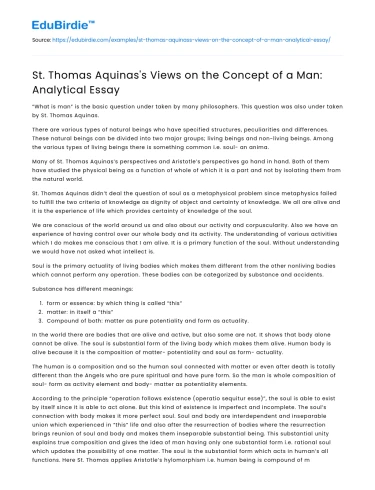“What is man” is the basic question under taken by many philosophers. This question was also under taken by St. Thomas Aquinas.
There are various types of natural beings who have specified structures, peculiarities and differences. These natural beings can be divided into two major groups; living beings and non-living beings. Among the various types of living beings there is something common i.e. soul- an anima.
Save your time!
We can take care of your essay
- Proper editing and formatting
- Free revision, title page, and bibliography
- Flexible prices and money-back guarantee
Many of St. Thomas Aquinas’s perspectives and Aristotle’s perspectives go hand in hand. Both of them have studied the physical being as a function of whole of which it is a part and not by isolating them from the natural world.
St. Thomas Aquinas didn’t deal the question of soul as a metaphysical problem since metaphysics failed to fulfill the two criteria of knowledge as dignity of object and certainty of knowledge. We all are alive and it is the experience of life which provides certainty of knowledge of the soul.
We are conscious of the world around us and also about our activity and corpuscularity. Also we have an experience of having control over our whole body and its activity. The understanding of various activities which I do makes me conscious that I am alive. It is a primary function of the soul. Without understanding we would have not asked what intellect is.
Soul is the primary actuality of living bodies which makes them different from the other nonliving bodies which cannot perform any operation. These bodies can be categorized by substance and accidents.
Substance has different meanings:
- form or essence: by which thing is called “this”
- matter: in itself a “this”
- Compound of both: matter as pure potentiality and form as actuality.
In the world there are bodies that are alive and active, but also some are not. It shows that body alone cannot be alive. The soul is substantial form of the living body which makes them alive. Human body is alive because it is the composition of matter- potentiality and soul as form- actuality.
The human is a composition and so the human soul connected with matter or even after death is totally different than the Angels who are pure spiritual and have pure form. So the man is whole composition of soul- form as activity element and body- matter as potentiality elements.
According to the principle “operation follows existence (operatio sequitur esse)”, the soul is able to exist by itself since it is able to act alone. But this kind of existence is imperfect and incomplete. The soul’s connection with body makes it more perfect soul. Soul and body are interdependent and inseparable union which experienced in “this” life and also after the resurrection of bodies where the resurrection brings reunion of soul and body and makes them inseparable substantial being. This substantial unity explains true composition and gives the idea of man having only one substantial form i.e. rational soul which updates the possibility of one matter. The soul is the substantial form which acts in human’s all functions. Here St. Thomas applies Aristotle’s hylomorphism i.e. human being is compound of matter and form.
It is totally opposite to Augustinian model where soul is dependent upon the body. But St. Swiezawski explained that in the human conception of St. Thomas soul is not only the spiritual but the principal which brings the uniformity of whole, psycho- physical human life and they both are interrelated for all human functions. The soul-form is the principle of unity and body-matter is the principle of individuation in human body which is the composition of soul and body.
This principle of the individuation is the attack to the isolated immortality of the soul (the individual soul is not eternal) by Latin Averroists. Their idea came out as the theory of monopsychism where they proposed that all humans at the basic level shares one and the same divine soul.
The composition of body and soul in human beings leads to the commensuratio (uniformity) where body is not accidently added to the soul but the soul as essence explains its subordinating commensuratio hereinto “this” body. This unity of the formal- material is experienced in every man as a compound substance. Uniformity of “this” body remains with the given soul all the time, with the existence of the soul and even after death, which makes possible the individual immortality.
All souls are substantially different due to matter which is not only body as corpuscularity but as possibility and potentiality by which the body is able to act. It constitutes the concrete material and spiritual area in which man lives.
God creates independent and immortal human soul which is tabula rasa as St. Thomas goes with Aristotle. So the human knowledge is not possible only on the intellectual abilities but dependent on senses. The physical body provides the sense data to the intellect- the activity of the human soul.
When our knowledge is dependent on senses than the soul is not able to know by itself. Principle of causality is the only possibility of acquiring knowledge through which one reaches to certain symptoms of physical life to the understanding of final physical cause i.e. soul.
The conception of human being as a person according to St. Thomas Aquinas gives the higher position to the man among all natural beings. So the man has to fulfill the responsibility of acting to maintain this position among all creatures. And this position is maintained if man understands his role in this world by “tilling it and keeping” it and not destroying since he is a physical being as a function of whole of which it is a part.






 Stuck on your essay?
Stuck on your essay?

